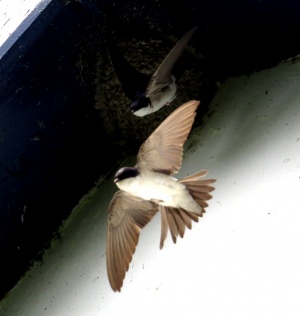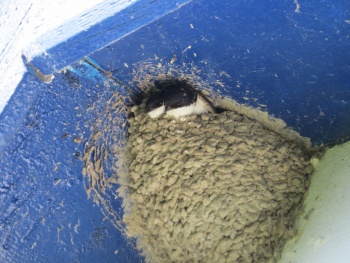Alternative names: House Martin; Northern House Martin
- Delichon urbicum
Delichon urbica
Identification
13–14 cm
- Blue black upperparts with a dark blue sheen
- White rump
- Longest upper tail coverts are wholly black or are only pale at the bases
- White throat, breast, flanks and undertail
- Axillaries are brownish-grey
Similar Species
Common Swifts appear all dark and very sickle or boomerang-shaped and are comparatively large compared to the three hirundines below.
Barn Swallows are mostly pale from below and all dark above, with a dark (and reddish) throat/head and long, dark tail streamers.
House martin are very white below and dark from above, with much shorter, dark tail, and a prominent white rump
Sand Martin are pale from below with a dark throat band, but noticeably brown-coloured.
There is a difference in the flying style too: House martin flight is more fluttery than a Barn Swallow which is faster, more direct and swooping, while Sand Martin are more fluttery still, and Common Swift are very fast and look somewhat stiff-winged.
Finally, the calls are all quite distinct: swift calls are quite loud and screeching, while swallows are more twittery and varied. House martin and Sand Martin calls are quite similar, less sustained than swallows possibly, and more chirpy and clipped, with sand martin being slightly scratchier or hoarse sounding
Distribution
Widespread and sometimes common, recent evidence of decline.
Taxonomy
Subspecies
There are 3 subspecies[1]:
- D. u. urbicum:
- D. u. meridionale:
- D. u. lagopodum:
Habitat
Aerial. Breeds in towns and rural areas.
Behaviour
Breeding
Gregarious, breeding colonially on buildings, under eaves and sometimes in cliffs. Nest of mud.
Diet
Almost entirely flying insects.
Vocalisation
References
- Clements, J. F., T. S. Schulenberg, M. J. Iliff, B.L. Sullivan, C. L. Wood, and D. Roberson. 2013. The eBird/Clements checklist of birds of the world: Version 6.8., with updates to August 2013. Downloaded from http://www.birds.cornell.edu/clementschecklist/download/
- Collins Pocket Guide to British Birds 1966
- BF Member observations
Recommended Citation
- BirdForum Opus contributors. (2024) Common House Martin. In: BirdForum, the forum for wild birds and birding. Retrieved 18 April 2024 from https://www.birdforum.net/opus/Common_House_Martin
External Links
Search the Gallery using the scientific name:
Search the Gallery using the common name:
GSearch checked for 2020 platform.







